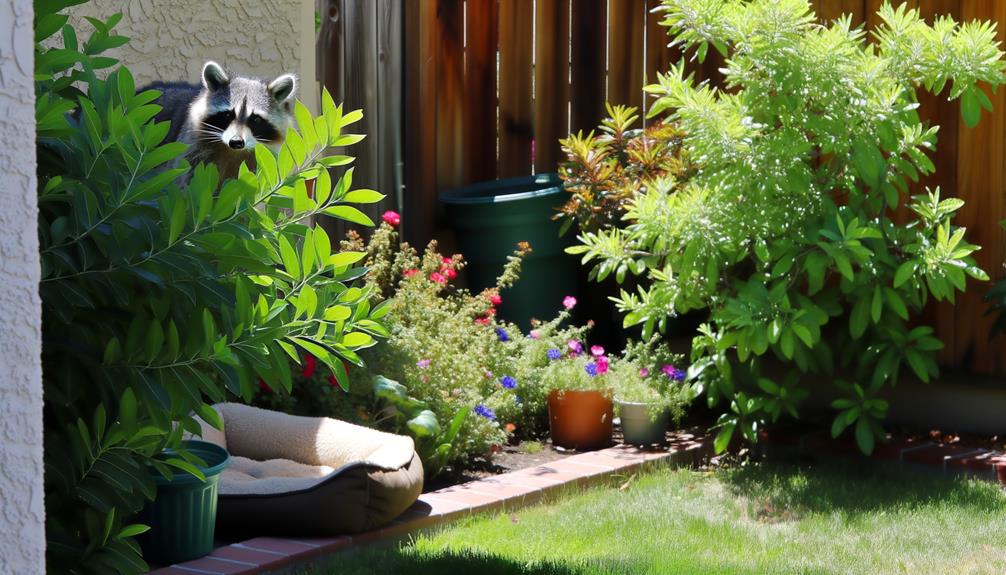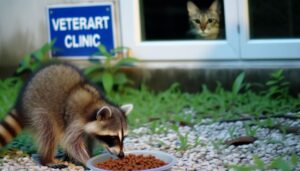How You Can Legally Have a Pet Raccoon in California
In California, owning a pet raccoon is illegal without a specific wildlife permit. These permits are rarely issued and are typically reserved for educational or research purposes.
This restriction ensures public safety and preserves ecological balance. Raccoons pose significant health risks, such as transmitting rabies and other zoonotic diseases.
Additionally, their care demands extensive knowledge of dietary and habitat needs, and they exhibit unpredictable behaviors. The ethical considerations around raccoon ownership further deter private individuals.
Various exotic pets, such as sugar gliders and hedgehogs, offer alternative options. Learn more about the legalities and ethical responsibilities associated with exotic pet ownership.

Key Takeaways
- Owning raccoons as pets in California is illegal without a specific wildlife permit.
- Permits for keeping raccoons are rarely granted and limited to educational or research purposes.
- Raccoons pose significant health risks, including rabies and other zoonotic diseases.
- Stringent regulations aim to protect public safety and ecological balance from non-native species.
- Ethical considerations emphasize animal welfare and the potential negative impact on local ecosystems.
California Wildlife Laws
California Wildlife Laws impose stringent regulations on the ownership and care of exotic animals, including raccoons, to guarantee public safety and ecological balance.
The California Department of Fish and Wildlife (CDFW) mandates that individuals obtain specific permits to house such animals. These permits are rarely granted and are typically reserved for educational institutions, scientific research, or rehabilitation purposes.
The laws aim to prevent the introduction of non-native species that could disrupt local ecosystems. Additionally, they seek to guarantee that exotic animals receive care commensurate with their needs, thereby preventing neglect and cruelty.
Health and Safety Risks
Owning a pet raccoon poses significant health and safety risks due to their potential to transmit diseases and exhibit unpredictable behavior. Raccoons are known carriers of various zoonotic diseases, which can pose serious health risks to humans and other animals.
Key concerns include:
- Rabies: Raccoons are primary carriers of rabies, which can be fatal if not treated promptly.
- Baylisascaris: This parasitic roundworm can cause severe neurological damage in humans if ingested.
- Leptospirosis: This bacterial infection can lead to kidney damage, liver failure, and even death.
Moreover, raccoons can be aggressive, especially when stressed or threatened, leading to potential injuries. These factors underscore the significant health and safety risks associated with keeping raccoons as pets.
Care and Maintenance
Proper care and maintenance of a pet raccoon require a thorough understanding of their dietary needs, habitat requirements, and behavioral characteristics. Raccoons are omnivorous, needing a well-rounded diet rich in proteins, vegetables, and fruits. Their habitat should be roomy, safe, and filled with activities to stimulate their intelligence and curiosity. Behavioral traits include high energy levels and a tendency for mischief, requiring attentive supervision.
| Aspect | Requirements |
|---|---|
| Diet | Proteins, veggies, fruits |
| Habitat | Roomy, safe, filled |
| Behavior | High energy, needs monitoring |
Proper maintenance safeguards the raccoon's well-being and reduces potential issues. Regular veterinary check-ups are essential to monitor health and prevent diseases. Understanding these requirements is essential for anyone considering raccoon ownership.
Ethical Considerations
The ethical considerations of keeping a pet raccoon revolve around the animal's welfare, the potential impact on local ecosystems, and the legal implications involved.
To start with, raccoons are wild animals with specific needs that can be challenging to meet in a domestic setting:
Animal Welfare: Captivity can lead to physical and psychological stress for raccoons, who are naturally inclined to roam and forage.
Ecosystem Impact: Introducing non-native species into local environments can disrupt existing wildlife and lead to unforeseen ecological consequences.
Legal Implications: In California, it is illegal to keep a raccoon as a pet without a specific wildlife permit, reflecting concerns about public health and safety.
Considering these factors ensures responsible and ethical decision-making regarding pet ownership.
Alternatives to Raccoons
For those interested in exotic pets, several alternatives to raccoons can provide a fulfilling and responsible pet ownership experience. Sugar gliders, for example, are small marsupials known for their sociability and unique gliding ability. Unlike raccoons, they require less space and are legal in most jurisdictions.
Another option is the fennec fox, renowned for its striking appearance and playful demeanor. These small canids adapt well to domestic environments with proper care.
Hedgehogs also present a viable alternative; their low-maintenance nature and endearing personalities make them excellent companions. It is essential to research and understand the specific needs of these animals to ensure ethical and sustainable pet ownership.
Selecting the right exotic pet can enrich lives while respecting legal and ethical boundaries.
Conclusion
The confluence of California wildlife laws, health and safety risks, care and maintenance intricacies, and ethical considerations forms a labyrinthine barrier to raccoon ownership.
The legal and logistical quagmire, coupled with moral dilemmas, renders the notion both impractical and fraught with peril.
For those enamored by the wild, alternative pets serve as a more viable sanctuary.
Consequently, the dream of a raccoon companion remains ensnared in the web of regulation and ethical quandary.






